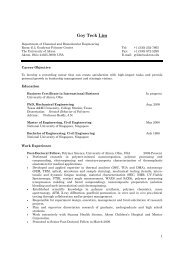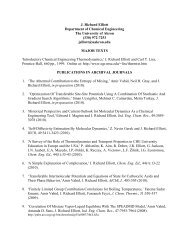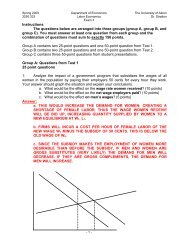Sociology of the Anarchists - Gozips.uakron.edu - The University of ...
Sociology of the Anarchists - Gozips.uakron.edu - The University of ...
Sociology of the Anarchists - Gozips.uakron.edu - The University of ...
You also want an ePaper? Increase the reach of your titles
YUMPU automatically turns print PDFs into web optimized ePapers that Google loves.
punishments for violating), and 3) norms are internalized, and thus people sanction<br />
<strong>the</strong>mselves. In terms <strong>of</strong> anarchism, <strong>the</strong>se three points are relevant to <strong>the</strong> ideas <strong>of</strong> order and<br />
law. Since anarchists believe <strong>the</strong>re can be order (even rules) without authority figures (or<br />
rulers), <strong>the</strong> idea <strong>of</strong> norms is very important. <strong>The</strong> first point, seems relevant to <strong>the</strong> example<br />
<strong>of</strong>fered by Fox (quoted in Barr 2002) about obeying traffic signals; not because its <strong>the</strong><br />
law, but because its a good idea—everyone benefits from observing <strong>the</strong>m. Fox explains:<br />
Anarchy isn’t a rebellion against all norms... I obey traffic<br />
lights, but I don’t obey <strong>the</strong>m because it’s <strong>the</strong> law. I obey<br />
<strong>the</strong>m because it’s a good thing to do. (p. ?)<br />
<strong>The</strong> second point implies some kind <strong>of</strong> authority figure or body that sanctions o<strong>the</strong>rs for<br />
<strong>the</strong>ir behavior. <strong>Anarchists</strong> would likely suggest that communities sanction individuals for<br />
behaviors, or, as in <strong>the</strong> third point, that <strong>the</strong>y sanction <strong>the</strong>mselves. Thus, one does not<br />
drive through red lights in traffic because <strong>the</strong>y know <strong>the</strong> dangerous consequences to <strong>the</strong><br />
safety <strong>of</strong> <strong>the</strong>mselves and o<strong>the</strong>rs (3), not because <strong>the</strong> police are going to arrest <strong>the</strong>m for it<br />
(2).<br />
Norms are still tenuous things. Many people disagree in society on what are problems and<br />
what to do about <strong>the</strong>m. <strong>Anarchists</strong> feel that emphasizing <strong>the</strong> first and third points above<br />
would advance <strong>the</strong> idea <strong>of</strong> a norm, more than <strong>the</strong> second point, which seems to point<br />
towards an authority figure or a law. [Explain this more... think about more...] Thus<br />
people give up autonomy for <strong>the</strong>se norms, in exchange for fairness, safety, and in<br />
exchange for partial control over <strong>the</strong> rights <strong>of</strong> o<strong>the</strong>r people's behavior. <strong>Anarchists</strong>, and<br />
o<strong>the</strong>r left/liberal folk would call this “<strong>the</strong> common good”.<br />
Coleman fur<strong>the</strong>r states that <strong>the</strong>re are two ways to guarantee that norms are followed: 1)<br />
“leadership” that makes <strong>the</strong>m/encourages <strong>the</strong>m to follow it. Hire police, regulators, or<br />
o<strong>the</strong>r organizations to monitor and enforce <strong>the</strong> norms. But, in addition to being costly,<br />
anarchists feel that this infringes upon individual liberty. 2) Establish <strong>of</strong> social structures<br />
and closed social networks that allow for <strong>the</strong> internalization <strong>of</strong> norms by involved parties.<br />
<strong>Anarchists</strong> would like this attitude much more, because it seems to allow for localized<br />
norms—what is good for one local community might not be for ano<strong>the</strong>r. But Coleman<br />
points to ano<strong>the</strong>r problem, that <strong>the</strong> tighter a social network, <strong>the</strong> more internalization and<br />
incremental sanctioning. Studies show that homogeneous social networks are more likely<br />
to vote and that closed networks encourage zealotry. Conversely, heterogeneous social<br />
networks are less likely to vote and <strong>the</strong> less closed networks encourage free riding. For<br />
anarchists, this paradox exists: how to encourage a diversity <strong>of</strong> opinions and backgrounds<br />
and still encourage people to be active? Also, closed anarchist scenes also seem to foster<br />
zealotry, as does <strong>the</strong> anarchist movement itself—indicated by many suggestions to wholly<br />
reject reform or liberalism, and to “not compromise!”—which would indicate that “<strong>the</strong><br />
movement” is still ra<strong>the</strong>r insular.<br />
Good examples <strong>of</strong> “anarchist” zealotry can be found, in this author's opinion, in <strong>the</strong> acts<br />
<strong>of</strong> <strong>the</strong> Animal Liberation Front (ALF) and Earth Liberation Front (ELF), and for <strong>the</strong> call<br />
by some anarchists to engage in armed resistance domestically (in an already<br />
marginalized movement). It would seem plausible that if anarchists read less Bakunin and<br />
[ Williams 28 ] [ this is a draft. do not cite. ]






